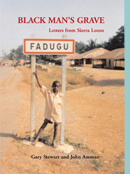 |
 |
|---|
|
|
Excerpt from Black Man's Grave DESCENT INTO EVIL
White man’s grave, someone once called this steamy stretch of West Africa’s coast where missionaries and colonial administrators routinely succumbed to the ravages of yellow fever, malaria, and dysentery. But for nearly eleven years beginning in 1991, black men, black women, and their children did the dying—most of it at the hands of their own brothers and sisters. Unlike the early white men, Sierra Leoneans at the end of the twentieth century held no hope of a ship on the horizon that might take them back to Lisbon or London. No quinine or anti-viral could stave off the worst of their affliction. Theirs was a condition of continual misery eased only slightly by a vague hope that the world might take notice and send help. The war that raged in Sierra Leone, the war that took the lives of thousands and left thousands more homeless, was born of the corruption and poverty that plagued the country since its independence. Like the crooked officials who controlled the government, the insurgents targeted Sierra Leone’s five million civilians, killing them, raping them, stealing their possessions and even their children, turning some into soldiers who would commit more atrocities. On March 23, 1991, a small band of armed rebels padded through the rain forest on Sierra Leone ’s southeastern border to launch a gruesome orgy. In the beginning the incursion seemed manageable. Writing from the village of Fadugu, some 200 miles north of the fighting, Umaru Mansaray, a farmer and budding businessman, echoed the Sierra Leone government’s initial assessment.
Soon after their first raids, the rebels identified themselves as Sierra Leoneans of the Revolutionary United Front (RUF) led by a cashiered army corporal named Foday Sankoh. But Charles Taylor, whose NPFL had been fighting for power in Liberia since Christmas Eve of 1989, bore much responsibility. Taylor had threatened to punish Sierra Leone for allowing a multi-national West African army to intervene in the Liberian conflict from a base at Sierra Leone’s Lungi International Airport. He also coveted his neighbor’s wealth of diamonds, which he could use to buy more guns and perhaps enrich himself. Although Taylor denied involvement with the RUF, it was inconceivable that the rebel group could have carried out its attacks from NPFL-held territory without his permission and assistance, if not outright instigation. That Taylor one day would be indicted for war crimes seemed like minimal justice, for the conflagration he helped to ignite—what looked at first like a minor brush fire—grew to involve every corner of Sierra Leone and took one of the largest contingents of United Nations forces ever deployed to extinguish. Excerpts from Black Man's Grave copyright © 2006 by Gary Stewart and John Amman. |
|---|
